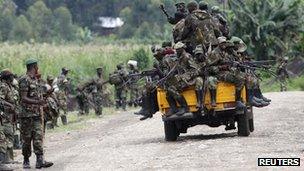UK stops £21m aid payment to Rwanda
- Published
- comments

Violence in the east of the Democratic Republic of Congo has drawn international condemnation
The UK has suspended aid to Rwanda amid concerns about its role in the conflict in Democratic Republic of Congo.
The International Development Secretary Justine Greening said a payment worth £21m would not now be released.
An aid payment of £16m was paid to Rwanda in September despite questions over the country's alleged support for the M23 militia in DR Congo.
Her predecessor, Andrew Mitchell, controversially authorised the payment on his last day in the job.
Ms Greening said the money, which was due to be paid next month, would not be released because President Paul Kagame's government had breached agreements.
She pointed to fresh evidence presented by UN experts earlier this month about Rwanda's role in the conflict, describing it as "credible and compelling".
"We are committed to finding lasting solutions to the conflict in this region and will work with the governments of Rwanda and DRC to secure a peaceful resolution to the situation in eastern DRC," she said.
She said the government would give a further £18m for immediate humanitarian needs in the DR Congo.
Mr Mitchell, who had previously frozen aid to the country, had cited progress at international talks as the reason for reinstating the payment.
Half of the aid package was paid as "general budget support" and half directly to the education and agriculture sectors.
In a report, the international development select committee said it "did not understand" how he had concluded the state was no longer backing the M23.
"Mr Mitchell has assured us that he carried out extensive consultations within the UK government and with the government of Rwanda before making his decision. The new secretary of state agreed that the decision-making process had been robust," the report said.
Downing Street denied this had been a mistake, saying the government "stands by the decision".
Mr Mitchell said it was made by the government, not just his department.
"It was the right decision when we made it in September just as today the Secretary of State has made the right decision because of the change in the DRC," he told BBC Radio 4's PM programme.
Former international development secretary Andrew Mitchell says suspending aid is "the right decision"
President Kagame has been praised for improving the economic and social conditions in the east African country since he came to power at the end of the 1994 genocide, in which some 800,000 people died.
But a UN report claims Rwanda's defence minister is effectively commanding the rebellion group in the east of the DR Congo (DRC). The BBC has uncovered evidence that Rwandan support for the rebels may be more widespread than previously believed.
'Harm Rwanda'
Rwanda's Foreign Minister, Louise Mushikiwabo, claimed the decision had been made on the basis of "false, politically-motivated allegations" in the UN report.
Shadow international development secretary Ivan Lewis welcomed the "belated" decision to suspend aid, and accused Mr Mitchell of a "serious misjudgement".
He said: "It is now important that aid continues to reach the poorest and most vulnerable in Rwanda and the DRC.
"We never accused Andrew Mitchell of being a rogue minister. However, recent developments have demonstrated his decision to unilaterally reinstate budget support to the government of Rwanda was a serious misjudgement."
Pressure group the TaxPayers' Alliance said it was "appalling" that any taxpayers' money had gone "directly to a government involved in a proxy war".
Campaign manager Robert Oxley added: "This announcement leaves a huge question mark over why Dfid, and specifically Andrew Mitchell, reinstated the aid programme to the Rwandan government which was fanning the flames of conflict in DRC."
- Published19 November 2012
- Published29 November 2012
- Published13 November 2012
- Published8 November 2012